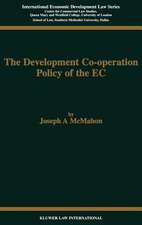The European Commission and Bureaucratic Autonomy: Europe's Custodians
Autor Antonis A. Ellinas, Ezra Suleimanen Limba Engleză Hardback – 29 apr 2012
| Toate formatele și edițiile | Preț | Express |
|---|---|---|
| Paperback (1) | 282.26 lei 6-8 săpt. | |
| Cambridge University Press – 30 apr 2014 | 282.26 lei 6-8 săpt. | |
| Hardback (1) | 786.17 lei 6-8 săpt. | |
| Cambridge University Press – 29 apr 2012 | 786.17 lei 6-8 săpt. |
Preț: 786.17 lei
Preț vechi: 914.15 lei
-14% Nou
Puncte Express: 1179
Preț estimativ în valută:
150.43€ • 157.49$ • 124.47£
150.43€ • 157.49$ • 124.47£
Carte tipărită la comandă
Livrare economică 05-19 aprilie
Preluare comenzi: 021 569.72.76
Specificații
ISBN-13: 9781107023215
ISBN-10: 1107023211
Pagini: 252
Ilustrații: 2 b/w illus. 36 tables
Dimensiuni: 140 x 218 x 20 mm
Greutate: 0.43 kg
Ediția:New.
Editura: Cambridge University Press
Colecția Cambridge University Press
Locul publicării:New York, United States
ISBN-10: 1107023211
Pagini: 252
Ilustrații: 2 b/w illus. 36 tables
Dimensiuni: 140 x 218 x 20 mm
Greutate: 0.43 kg
Ediția:New.
Editura: Cambridge University Press
Colecția Cambridge University Press
Locul publicării:New York, United States
Cuprins
1. Introduction; 2. The autonomy of national and transnational bureaucracies; 3. Surveying top European bureaucrats; 4. Autonomy at the top of the European bureaucracy; 5. Political attempts to alter bureaucratic behavior; 6. Cultural impediments to political control; 7. Custodians of 'Europe'; 8. Bureaucratic attitudes and policy outputs; 9. Conclusion.
Recenzii
“The countries of Europe have been undergoing hard times. Their most innovative achievement, the European Union, has come under increasing scrutiny as citizens deem that integration may be a significant part of the problem. Critics on both the Left and Right worry that Brussels has too much power, and that senior civil servants of the EU need to be held accountable. This book is a study of the politics of the European Commission and is in the best traditions of empirical research. Ellinas and Suleiman’s interviews allow them to establish that European civil servants do indeed share a culture favoring continued integration. They find that political criticism reaffirms the Eurocrats’ supranational convictions, and that the mandarins of Brussels enjoy more autonomy than their political masters in the member states might like. Defenders and critics of the European project will find this study very useful reading.”
—Harvey B. Feigenbaum, The George Washington University
“A fascinating European version of the ‘tail wagging the dog’: in spite of harsh criticism from political elites as well as public opinion, EU bureaucrats manage to avoid being controlled by their too many political masters and remain at the center of the game. They are the ‘custodians,’ but who will guard the guardians? This is a book that anyone interested in European affairs should read. It will be a classic in bureaucratic politics studies.”
—Yves Mény, Emeritus President, European University Institute
“This study of the European Union bureaucracy makes a major contribution to the study of both the EU and public bureaucracies. Of the institutions within the EU, less is known about the bureaucracy than the other institutions, and this study demonstrates how the bureaucracy uses its own resources to promote its autonomy. The study also demonstrates how much we can learn about governing by simply asking the people involved some basic questions about what they do and how they do it.”
—B. Guy Peters, University of Pittsburgh
“No study of the EU bureaucracy is comparable to Ellinas and Suleiman’s book. This is an indispensable analysis of the relatively integrated culture of the senior high-level bureaucracy in Brussels in an EU composed of an increasingly disparate array of member states. The book’s analysis derives from a systematic survey of these officials, and it is written with eloquence and acuity.”
—Bert A. Rockman, Purdue University
“The European Commission remains at the heart of European integration, also in time of crisis. Ellinas and Suleiman’s organizational sociology approach concentrates on the educational and the career-driven background as well as the multiple accountability of Commission civil servants. Their book makes a powerful argument against those who argue that the Commission has lost momentum. The authors argue that, on the contrary, the multicephalous structure of the political authority in the European Union limits the capacity of political actors to curb the Commission’s authority and at the same time helps the Commission to define a strategy that might reinforce its legitimation. A must-read for all those interested in the functioning of the Commission.”
—Sabine Saurugger, Sciences Po Grenoble/Institut universitaire de France
"By building on earlier studies that focus on the role of the European bureaucracy and relying on extensive survey research, Ellinas and Suleiman offer an empirically sound study that assesses the European Commission within the broader context of political legitimacy and autonomy. Summing Up: Recommended" -A.E. Wohlers, Cameron University, CHOICE Magazine
—Harvey B. Feigenbaum, The George Washington University
“A fascinating European version of the ‘tail wagging the dog’: in spite of harsh criticism from political elites as well as public opinion, EU bureaucrats manage to avoid being controlled by their too many political masters and remain at the center of the game. They are the ‘custodians,’ but who will guard the guardians? This is a book that anyone interested in European affairs should read. It will be a classic in bureaucratic politics studies.”
—Yves Mény, Emeritus President, European University Institute
“This study of the European Union bureaucracy makes a major contribution to the study of both the EU and public bureaucracies. Of the institutions within the EU, less is known about the bureaucracy than the other institutions, and this study demonstrates how the bureaucracy uses its own resources to promote its autonomy. The study also demonstrates how much we can learn about governing by simply asking the people involved some basic questions about what they do and how they do it.”
—B. Guy Peters, University of Pittsburgh
“No study of the EU bureaucracy is comparable to Ellinas and Suleiman’s book. This is an indispensable analysis of the relatively integrated culture of the senior high-level bureaucracy in Brussels in an EU composed of an increasingly disparate array of member states. The book’s analysis derives from a systematic survey of these officials, and it is written with eloquence and acuity.”
—Bert A. Rockman, Purdue University
“The European Commission remains at the heart of European integration, also in time of crisis. Ellinas and Suleiman’s organizational sociology approach concentrates on the educational and the career-driven background as well as the multiple accountability of Commission civil servants. Their book makes a powerful argument against those who argue that the Commission has lost momentum. The authors argue that, on the contrary, the multicephalous structure of the political authority in the European Union limits the capacity of political actors to curb the Commission’s authority and at the same time helps the Commission to define a strategy that might reinforce its legitimation. A must-read for all those interested in the functioning of the Commission.”
—Sabine Saurugger, Sciences Po Grenoble/Institut universitaire de France
"By building on earlier studies that focus on the role of the European bureaucracy and relying on extensive survey research, Ellinas and Suleiman offer an empirically sound study that assesses the European Commission within the broader context of political legitimacy and autonomy. Summing Up: Recommended" -A.E. Wohlers, Cameron University, CHOICE Magazine
Notă biografică
Descriere
Documents the struggle of the European Commission to maintain its autonomy in a complex institutional setting and adverse political environment.



























